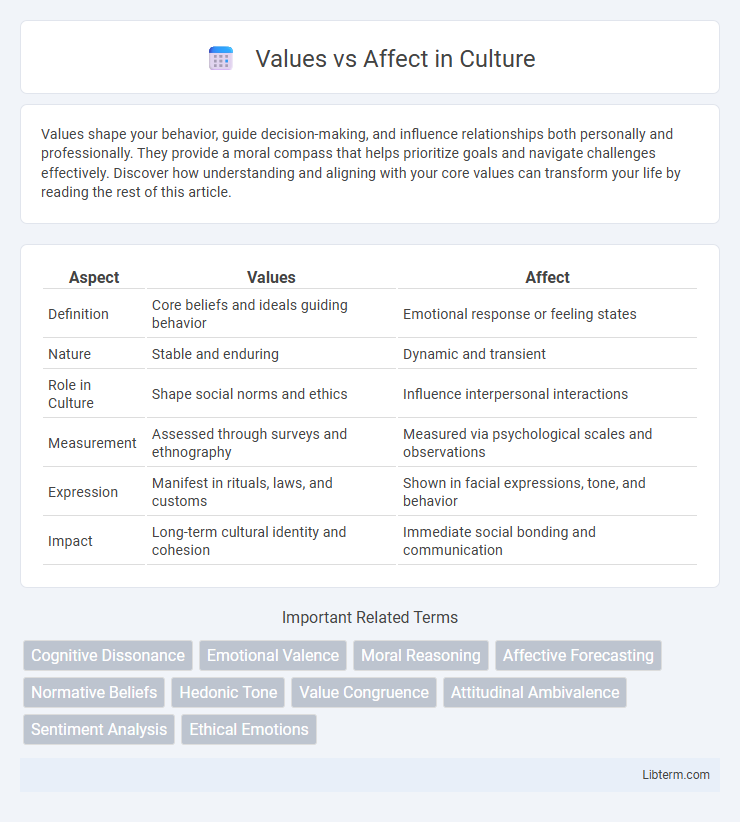Values shape your behavior, guide decision-making, and influence relationships both personally and professionally. They provide a moral compass that helps prioritize goals and navigate challenges effectively. Discover how understanding and aligning with your core values can transform your life by reading the rest of this article.
Table of Comparison
| Aspect | Values | Affect |
|---|---|---|
| Definition | Core beliefs and ideals guiding behavior | Emotional response or feeling states |
| Nature | Stable and enduring | Dynamic and transient |
| Role in Culture | Shape social norms and ethics | Influence interpersonal interactions |
| Measurement | Assessed through surveys and ethnography | Measured via psychological scales and observations |
| Expression | Manifest in rituals, laws, and customs | Shown in facial expressions, tone, and behavior |
| Impact | Long-term cultural identity and cohesion | Immediate social bonding and communication |
Understanding Values and Affect: Core Concepts
Values represent enduring beliefs guiding individuals' judgments about what is important, while affect refers to immediate emotional responses influencing attitudes and behaviors. Understanding values involves recognizing their role as stable motivational goals shaping long-term decision-making, whereas affect captures transient feelings that can alter perceptions and reactions in specific contexts. The interplay between values and affect is crucial for comprehending how stable preferences interact with momentary emotions to drive human behavior.
The Psychological Foundations of Values
Values represent deeply held beliefs that guide behavior and decision-making, rooted in cognitive structures within the brain's prefrontal cortex responsible for moral reasoning and identity formation. Affect, involving emotional responses generated by limbic system activity, influences how values are experienced and prioritized in real-time situations. The psychological foundations of values integrate cognitive evaluations and affective reactions, shaping consistent motivational patterns essential for adaptive social functioning and personal coherence.
Defining Affect: Emotions and Moods
Affect encompasses the broad range of feelings that individuals experience, including both emotions and moods, which influence decision-making and behavior. Emotions are intense, short-lived responses to specific events, characterized by distinct physiological and psychological changes, while moods are longer-lasting, less intense affective states without a clear cause. Understanding the distinction between emotions and moods is crucial for analyzing how affect shapes human motivation and interpersonal interactions.
Values vs Affect: Key Differences
Values represent enduring beliefs that guide behavior and decision-making, while affect refers to immediate emotions and feelings influencing momentary responses. Values are stable and shape long-term goals, whereas affect varies rapidly and impacts short-term mood and reactions. Understanding the distinction is crucial for psychology, marketing, and behavioral economics to predict actions accurately.
How Values Shape Decision-Making
Values serve as fundamental guiding principles that influence decision-making by prioritizing long-term goals and ethical standards over immediate emotional reactions. They provide a stable framework that helps individuals evaluate options consistently, ensuring choices align with deeply held beliefs and societal norms. This process minimizes impulsive behaviors driven by affect, promoting decisions rooted in deliberate reasoning and personal or collective integrity.
The Role of Affect in Everyday Choices
Affect significantly influences everyday choices by shaping preferences and decision-making processes through emotional responses. Emotions activate neural pathways linked to reward and punishment, guiding individuals toward options that maximize positive feelings and minimize negative ones. This affective impact often operates subconsciously, demonstrating that values alone do not dictate behavior without the dynamic modulation of emotional states.
Interplay Between Values and Affect
Values and affect are interconnected psychological constructs where values serve as enduring guiding principles influencing emotions and affective responses. The interplay between values and affect shapes decision-making, as strong emotional reactions often reinforce the importance of specific values. Research indicates that affective experiences can both reflect and modify values, creating a dynamic feedback loop essential for adaptive behavior and personal identity.
Impact on Behavior: Values versus Affect
Values provide a stable framework guiding long-term behavior by shaping goals and principles, while affect influences immediate emotional responses and decision-making in specific situations. The impact on behavior differs as values promote consistent actions aligned with personal or societal ideals, whereas affect drives spontaneous reactions based on current mood or feelings. Understanding this distinction aids in predicting behavior by distinguishing between enduring motivations and transient emotional states.
Influences of Culture on Values and Affect
Culture shapes values by defining what is considered important, guiding principles, and moral priorities within a society, influencing behavior and decision-making. Affect, as emotional responses and expressions, is deeply embedded in cultural norms that determine how feelings are experienced, displayed, and communicated across different social contexts. These cultural influences create variations in core values and affective responses, impacting interpersonal relationships and social cohesion globally.
Practical Implications: Balancing Values and Emotions
Balancing values and emotions is crucial for effective decision-making and interpersonal relationships in various settings such as the workplace and personal life. Emphasizing core values ensures consistency and long-term integrity, while acknowledging affect allows for empathy and adaptability in dynamic situations. Practical approaches include reflective practices and emotional regulation strategies that align affective responses with value-driven goals.
Values Infographic

 libterm.com
libterm.com